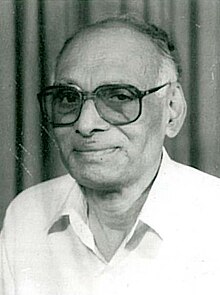This article has multiple issues. Please help improve it or discuss these issues on the talk page. (Learn how and when to remove these messages)
|
| Dr. Madiraju Ranga Rao | |
|---|---|
 | |
| Born | (1935-08-06) 6 August 1935 (age 89) Pandithapuram, Yellandu, Khammam |
| Occupation | Telugu Poet and Writer |
| Nationality | Indian |
| Citizenship | India |
| Genre | Classical Literature Indian Poetics Modern Poetry, Novel and Criticism Studies in Sanskrit Literature |
| Relatives | Sri Narayana Rao (father) |
Madiraju Ranga Rao (born 1935) is a scholar of Telugu Literature, associated with Classical Literature, Indian Poetics, Modern Poetry, Novel & Criticism and Studies in Sanskrit Literature.
Education
Madiraju Ranga Rao was a student of Telugu Literature with qualifications in M.A. Telugu (Osmania University 1962), Ph.D (Osmania University 1966)and M.A. Sanskrit (Osmania University 1969). His Doctoral Thesis is "Concept and Practice of Poetry of Kavitrayamu".
Career
Madiraju Ranga Rao is one of the foremost literary writers in Modern Telugu Poetry.
Professor Madiraju Ranga Rao taught Telugu and Sanskrit Literature at Kakatiya University (1968–95) and Osmania University (1964–68), Andhra Pradesh, India. During his tenure, he has undertaken research supervision of 12 M. Phil and 10 Ph. D. research scholars.
He was a member of Editorial Committee of Critical Edition of Andhra Maha Bhagavatham (Chief Editor, Acharya Raya Prolu Subba Rao) and Member of the Editorial Board of Critical Edition of Andhra Maha Bharathamu sponsored by the UGC (Chief Editor, Acharya Khandavalli Laxmi Ranjanam).
Ranga Rao has been the Principal Investigator of two major research projects of University Grants Commission (UGC), New Delhi. The two projects are "Concept of Democracy and National Integration in Free-Verse" and "National, International and Human Facets in Post-Independence Telugu Free-Verse". During 2004–06, he was also Senior Fellow, Department of Culture, Government of India
Ranga Rao's research interests include Classical Literature, Indian Poetics, Modern Poetry, Novel and Criticism & Studies in Sanskrit Literature. He has made a significant contribution in the field of Modern Telugu Poetry and Research & Literary Criticism. Ranga Rao's prominence in Telugu Literature came with his distinctive poetry "Sveccha Kavithvam".
Since 1952, Ranga Rao has been writing extensively in various journals including Swatantra, Navatha, Bharathi, Sravanthi, Jayanthi, Vangmayi, Musi, Andhra Prabha, Andhra Bhoomi etc. He published close to 46 books on Sveccha Kavithvam and 14 books on Research & Literary Criticism.
Ranga Rao won the Best Teacher award in 1992 for teaching and research studies. In the year 1993, he won the Best Modern Poetry award from Telugu University, Hyderabad.
Ranga Rao is the founder and editor of Rasadhuni Sahithi Parishat since 1970
Publications
A. Research & Literary Criticism
- Kavithrayam-Srujana Kala Shilpam
- Sveccha Kavithvam
- Navala Swaroopam
- Parishodhana Svaroopam
- Adhikara Bhasha
- Anuvada Kala
- Sri Sri Maha Prasthanam
- Dasarathi Punarnanam
- Sama Darshini
- Alokanam Literary Essays
- Srujana Drushti-Manaveeya Bhavana
- Sahitya Vyasalu
- Facets of Telugu Free-Verse
- Srujana Chetana-Kalpavruksham
B. Poetry: Sveccha Kavithvam
- Maananaveeyam
- Padagettina Udayam
- Mukta Dhatri
- Idi Vietnam
- Manobhoomikalo
- Jeevana Rekhala
- Mukthakalu
- Avaahanam
- Nalo Pravahistondi Nadi
- Naku Jnapakamundi
- Manobhoomikalo
- Velugulo Ee Nelapi
- Melkonna Ee Samayam
- Shabdamai Pranamai
- Agnimayam Jeevitham
- Kalanni Nilipi Kshanam
- Ee Thram Svara Chitram
- Ashanthi Orchestra
- Varthamanam Screen Pai
- Agninundi Anandaniki
- Jail Corner Nundi
- Payanam Nundi Anandanki
- Diary Darpanamlo
- Ee Shatabdi Rekkalapai
- Shanti Svapnam
- Cross Fire
- Cease Fire
- Nedu Repu Madhya
- Kirana Padham
- Abhishekam
- Agamanam
- Eppatiki Kothe
- Srujana Darshanam
- Maro-vaipu
- Hrudaya Megham
- Samakaleenam
- Abhinava Yanam
- Antharanga Dhvani
- Navarambham
- Navadarshanam
- Gift- Packet
- Punardarshanam
- Nadiche Velugu Chuttu
- Apoorva
- Ajnatham Nundi
- Roju Vasthnudi Svacchanga